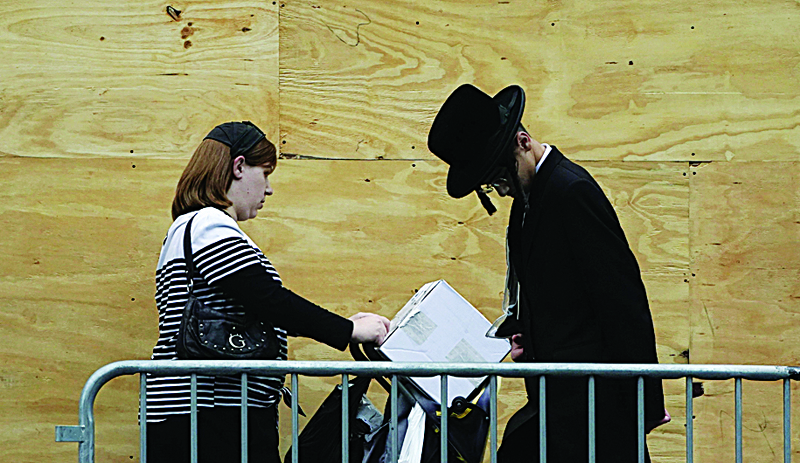
NEW YORK: As cases of coronavirus tick up again in New York, particularly in neighborhoods with significant populations of Orthodox Jews, some residents of those areas say they feel attacked or insulted, accusing authorities of creating a stigma based on their faith. For two weeks the positivity rate - the proportion of positive results out of the total number of tests performed - has been rising in America's most populous city.
After 23,800 deaths, and months as the globe's epicenter of the pandemic, New York recently had become a model of containment. But after long hovering around one percent, that key positivity indicator on Tuesday exceeded three percent, what Mayor Bill de Blasio called "cause for real concern."
According to authorities, the most significant jumps involve neighborhoods of Brooklyn where Orthodox Jewish populations are substantial, and coincided with gatherings linked to the recent holidays of Rosh Hashanah and Yom Kippur. Governor Andrew Cuomo also said cases are spiking in parts of the New York suburbs that are home to Orthodox communities, saying he was set to meet with religious leaders to discuss combatting the spread.
The mayor said the city was sending police and health workers to impacted neighborhoods to promote distancing and mask-wearing - and to issue summons if necessary to anyone refusing to comply. "This is an inflection point," de Blasio said. "We have to take more action at this point… we will be escalating with each day depending on what we see happening on the ground."
'Feel attacked'
City Hall is aiming not to single out New York's diverse Jewish communities by name, but tensions are palpable. Last Friday, health officials faced heckling during an outreach effort at a Brooklyn park. "Brooklyn is not a Jewish community, we are part of the community," said Steve Zuker, 52, speaking in front of the Landaus Shul, a synagogue in the Midwood neighborhood where the positivity rate is approaching six percent. "We feel attacked, and when you are attacked on your belief, people attack back," he said.
Some people also cite several tweets that the mayor posted as the epidemic peaked in April: de Blasio triggered fury after threatening "the Jewish community" with summons and arrest after a large crowd of Hasidic Jews gathered for a rabbi's funeral in Brooklyn's Williamsburg neighborhood. According to Zuker, his community leaders are promoting awareness of COVID-19 risks, while also distributing masks and adding temporary spaces to allow for social distancing of some 2,000 worshippers.
But, he acknowledges some people dismiss the risks and don't want to follow recommendations - as boys from the synagogue shout "fake news" at AFP journalists. Zuker says some people believe they have antibodies and are safe from further infection, using that idea as an excuse not to exercise social distancing. "You try to provide and do the right thing, and the rest, we believe in God -hopefully he is going to do the right thing," he said, pointing skyward.
Tensions rising
In these neighborhoods as in many others nationwide, the approaching presidential election has fostered polarization. Speaking in front of the Midwood synagogue, one young man, who identified himself by his initials M E, accused the "liberal media" and "Socialist party" of sowing divisions. "People just try to destroy us," the 20-year-old said. "We're trying to be careful. For people to say that we are not being careful, it's insulting."
Akiva, a 38-year-old teacher at a Yeshiva school, aims to keep calm amid the agitation - and emphasizes the Orthodox community is not a united block, and includes many viewpoints. For Akiva, the son and brother of doctors, the rise in positive cases is linked to the fact that for several months infections stayed minimal, so social distancing relaxed. "Now it's moving up again, so I think you're going to see compliance jumping," he said. Leading rabbis have mobilized to encourage precautions, Akiva said: "Nothing's going to change overnight, but I do think that has definitely helped." - AFP









